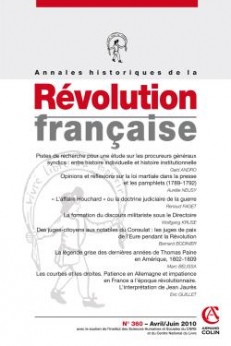
Annales historiques de la Révolution française n° 360 (2/2010)
Pour acheter ce numéro, contactez-nous
Recevez les numéros de l'année en cours et accédez à l'intégralité des articles en ligne.
Cet article examine la représentation des rapports entre l’armée de la Révolution et la société civile dans le discours politique des militaires et des civils de 1795 à 1799. Il rend compte de la genèse d’un projet de domination de la société civile par les militaires, perçu comme condition préalable de la prise du pouvoir par Bonaparte et comme point de départ du militarisme moderne. Ce projet s’est constitué en trois étapes, caractérisées par un certain discours, qui aboutirent à renverser la conception révolutionnaire d’une armée de civils : l’élaboration d’une opposition fondamentale entre les militaires de la Révolution et une société civile soi - disant dégénérée, l’intense politisation de cette opposition à l’occasion du coup d’État de Fructidor en 1797 et la transformation de ces thèses en un militarisme visant certains objectifs lors de la reprise de la guerre en 1798 et 1799.
This article examines the representation of the relationship between the army of the Revolution and civil society in the political discourses used by the military and civilians between 1795 and 1799. It gives an account of the evolution of a plan for the domination of civil society by the military, considered as a prerequisite to the seizure of power by Bonaparte, and as a point of departure for modern militarism. This project comprised three stages, each characterized by a certain discourse, resulting in the rejection of the revolutionary concept of a civilian army : the development of a fundamental opposition between the military personnel of the Revolution and that of so- called degenerate civil society, the intense politisation of this opposition at the time of the « coup d’État » of Fructidor 1797, and the transformation of this thesis into a militarism having certain objectives at the time the war resumed in 1798 and 1799.